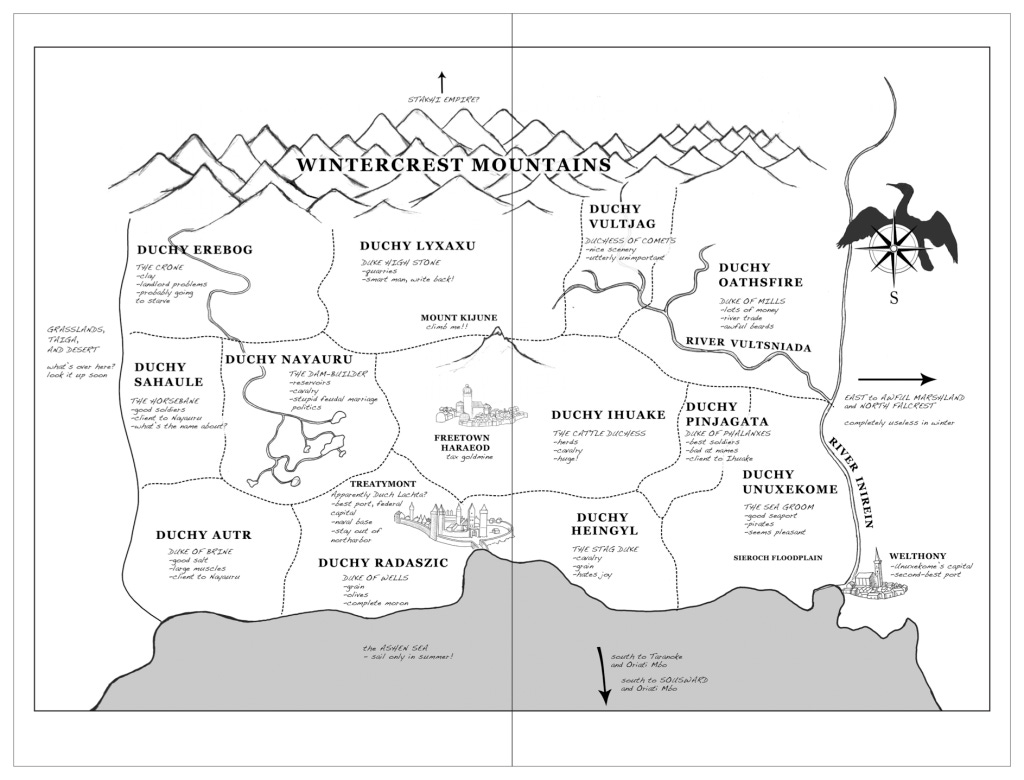SF/F Review - The Traitor Baru Cormorant
The Traitor Baru Cormorant, by Seth Dickinson
Synopsis: To overthrow the Empire that devastated her homeland, Baru infiltrates it to become one of its powerful bureaucrats and destroy it from within.
Book Review: The first thing you see in the book is the map (below). And right away the book lets you know this will be different from what you’re used to. Maps always show what is important to the mapmaker. In most fantasy books this is the territory of the journey. The hero’s hometown to the Stronghold of Evil. In between are national borders, the mountains that stop armies, the Dark Forest where the hero is tested. In Traitor Baru, the borders barely matter. They’re loosely roughed in. There are no major physical features, aside from the rivers that facilitate trade. What the map DOES show is political allegiances, economic ties, and resource dependence/abundance. Right away the book is telling you “This is not about wars and movement. This is about political influence, and economic power.” It’s a brilliant way to start a book. Or rather, to start THIS book.
If you like smart characters with smart opponents who manipulate their environments with whatever tools they have – tools which they often go to great lengths to make available to themselves – you will like this book. And by “environments” I do mean physical environment sometimes, but more often the social and political forces that can alter much more around you than you could alter by yourself. This is a book of out-thinking your enemy, and hard choices.
And really, the hard choices is what it all comes down to. I’ve written before about how much I love Seth Dickinson’s short fiction. One of his recurring themes (and certainly present in Traitor Baru) is “How much are you willing to sacrifice, to do the right thing?” How much will you give up to save the innocent from the corrupt? Forget silly things like your body or your life – how much of your soul will you give? Is your very humanity that important, when compared to the world you will be saving?
This theme runs a livewire through my psyche. I cannot get enough of it. Dickinson executes it well… although not quite as well as in his short stories. In his shorts he holds nothing back. The novel Traitor Baru is, surprisingly, very emotionally reserved. One fellow reader speculated that this is an effort to get us to sympathize with Baru’s life trapped in the closet. Not just about her sexuality, but about every single thing she cares about. Her world is lies upon masks upon lies, and she assumes that everyone around her lies just as much as she does. As a result she can never show true emotion, and expects that no one else does either. This makes sense as self-defense, but it hurts the emotional narrative. Another fellow reader speculated that this was necessary as a mercy to the reader, because, if we were too involved with Baru emotionally, most readers would not be able to endure the story (it is a very painful story), and especially not the gut-punch ending (seriously, the ending is fucking amazing). It’s hard enough to read even as emotionally-dampened as it is. Perhaps that’s true? But I want that pain in my fiction, I thrive on it. I was disappointed it wasn’t sharper. A final conjecture was that Baru is at least somewhat autistic, which… duh. Of course she is. That doesn’t mean the emotion needs to be held back from the reader, we’re inside her head.
Also, I really could have used some more visceral scenes of the Empire’s evil. Yes, I get it, colonialism is bad. Agreed. But “colonialism is bad” isn’t emotionally compelling, whereas “watching teeth fly and blood pool as someone kicks my father to death” is. There was a lot of the former and very little of the latter.
So, it’s not a perfect book. But it is still really good. Recommended.

Book Club Review: This book sparked one of the best discussions we’ve had. First, there’s simply so much to discuss. Not just about imperialism and sexuality and technological change either, but ranging across Baru’s choices, her view of the world as a puzzle, and the nature of our humanity. Is there anything that should be off-limits to sacrifice, if the rewards are great enough? At what point does certainty-of-outcomes breakdown enough that you should revert to deontology over utilitarianism? If you somehow exhaust that topic, there’s also stylistic choices that Dickinson made to be discussed--there’s plenty to say about his writing as well as about what was written. Even the people in our group who really disliked the book said this was an amazing discussion, they loved the book club meeting itself, and they were glad they read it and attended to discuss it. I’m not sure you can get a much greater endorsement when evaluating a book for book-club-suitability. HIGHLY Recommended!
Cultural Appropriation Watch! The protagonist is a dark-skinned, gay woman. Seth Dickinson is a white man. I dunno about his sexuality, cuz I don't know him well enough for that to be any of my damn business. The Appropriation Police would not allow this book to be published. They shame their ancestors, let us hope they repent their ways quickly.



